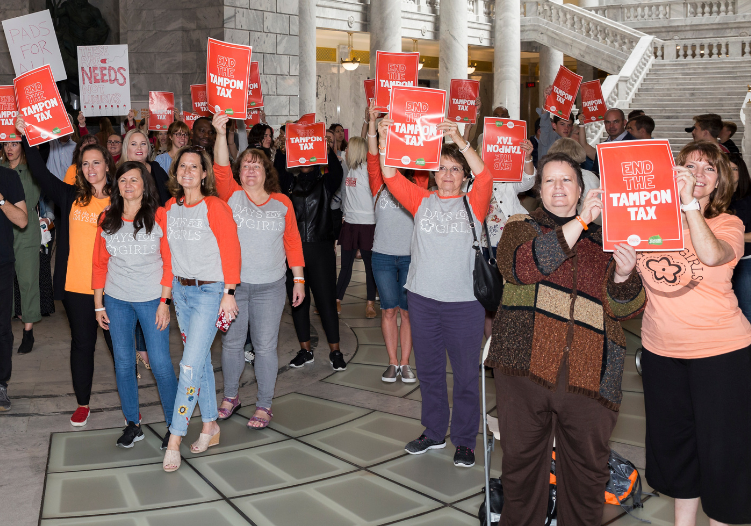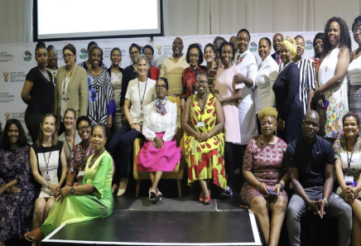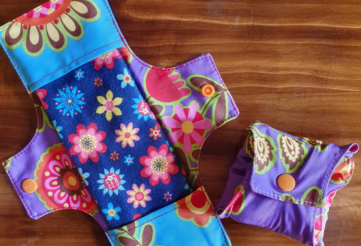
You have the power to change the world
At DfG, we envision a world where governments enact legislation and allocate resources to improve Menstrual Health, international development goals and indicators include Menstrual Health and our global community recognizes that menstruation matters to improve education and livelihood outcomes. Read about some of our most exciting achievements below.
"I alone cannot change the world, but I can cast a stone across the waters to create many ripples." - Mother Teresa
Launching the South African Coalition for Menstrual Health Management (SACMHM)
 Days for Girls worked in collaboration with the South Africa Department of Women, UNFPA, WaterAid, and other stakeholders in order to launch the South African Coalition for Menstrual Health Management (SACMHM) in March 2020.
Days for Girls worked in collaboration with the South Africa Department of Women, UNFPA, WaterAid, and other stakeholders in order to launch the South African Coalition for Menstrual Health Management (SACMHM) in March 2020.
The South African Coalition is intended to coordinate stakeholders, mobilize resources, research, monitor, evaluate and provide a platform for learning and sharing evidence-based research and best practices in Menstrual Health Management.
At the time of its launch, the Coalition’s top priorities were to:
-
Expedite the review of the washable menstrual products and menstrual cups’ standards in collaboration with the South African Bureau of Standards (SABS), to widen the choice of safe sanitary products. Amazingly, this goal has already been achieved! SABS passed a washable standard in May 2020.
-
Intensify advocacy efforts for the safe menstruator-friendly toilets.
Improving Public Access to Menstrual Materials in Maryland State

Janet Schiller, the Chapter Leader for the Rockville, Maryland USA Chapter, was inspired by the passage of New York City’s Local Law 83, which provides free menstrual hygiene supplies to menstruators in prisons, homeless shelters and schools, in June 2016. She wondered if her home state could do something similar.
Janet approached her representatives, working with District 15 House Delegate Aruna Miller to propose new legislation — and it passed! In May 2017, Maryland became the first state to pass such legislation on a statewide basis. Since then, there has been movement on this issue in other states across the US.
Click here to watch Janet and Aruna’s presentation to the Maryland House Appropriations Committee.
Piloting Education Partnerships in Cambodia

In 2019, DfG began partnering with the Cambodia Ministry of Education, Youth, and Sports (MoEYS) and the local NGO CRESO to develop a Menstrual Health (MH) Program Curriculum Overview. The goal of this Overview is to integrate MH into Cambodia National Curriculum by providing two MH lessons per year for all students grades 5-12.
The 2020 pilot involves comprehensive teacher training and piloting lesson plans for grade 5. The lesson plans, which combine DfG’s comprehensive MH education with a story and three activities from WASH United’s MHM Education Guide, offer grade 5 students a body-positive introduction to menstruation. Seven schools across Phnom Penh, Rtanakiri, Mondulkiri, and Kratie are participating in the pilot teacher training, lesson implementation, and evaluation.
To evaluate impact, we’re working with a local evaluation company to gather comprehensive student and teacher feedback that will help inform the program moving forward. If the pilot is successful, our long-term vision is to assist MoEYS in implementing comprehensive, age-specific lesson plans for grades 6-12 in schools across the entire country. A full integration of MH into the National Curriculum will contribute to increased body literacy, decreased shame and stigma, and positive views of puberty and menstruation for all students in Cambodia!
Partnering with County Government in Kenya

Days for Girls Enterprise Leader and Menstrual Health Champion Anita Byegon is advocating to transform the Menstrual Health (MH) environment in her home county of Bomet, Kenya through partnership with government ministries.
Anita partnered with the Bomet County Ministry of Public Health to train Community Health Workers (CHWs) in DfG Ambassador for Women’s Health (AWH) comprehensive MH education. This training has equipped CHWs to be key educators for Menstrual Health and Hygiene, providing household and community level education throughout their local catchment areas. Anita shares that the work of CHWs has helped to break the silence on menstruation far and wide in Bomet.
Anita’s advocacy work has also helped to address issues such as Gender Based Violence (GBV). The Ministry of Gender and Social Services in Bomet has approved three-day youth trainings to provide education on Menstrual Health Management (MHM) and GBV, which are often related. These trainings will include all genders and take place quarterly over the next five years, reaching more than 2,500 youth in Bomet County.
South Africa Washables Standard
 On International Menstrual Hygiene Day, May 28, 2020, the South African government announced the publication of the washable reusable sanitary towel standard. The publication of this standard is one of the first of its kind in Southern Africa.
On International Menstrual Hygiene Day, May 28, 2020, the South African government announced the publication of the washable reusable sanitary towel standard. The publication of this standard is one of the first of its kind in Southern Africa.
DfG acted as a member on the South African Business Standards (SABS) committee that worked on the development of this standard for two years. The purpose of the standard is to ensure the consumer that a washable pad tested by SABS is made with quality material, is absorbent, and is safe.
This standard will help broaden the product choices to ensure women and girls have access to another safe, hygienic menstrual product. This is an exciting milestone and of utmost importance to our organization since we advocate for the menstrual health and safety of menstruators.
Click here to read the official press release.






